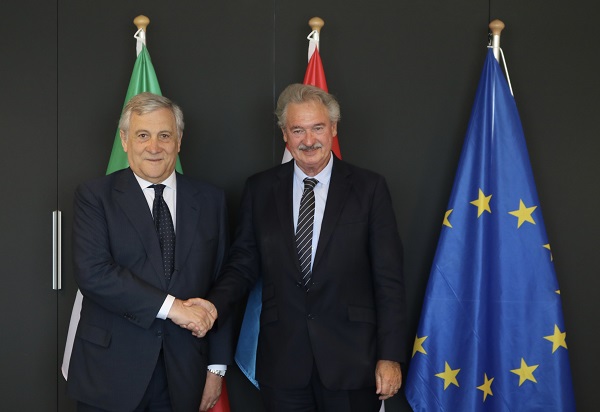 (L-R) Antonio Tajani, Italy's Minister of Foreign Affairs; Jean Asselborn, Luxembourg's Minister of Foreign and European Affairs;
Credit: MAEE
(L-R) Antonio Tajani, Italy's Minister of Foreign Affairs; Jean Asselborn, Luxembourg's Minister of Foreign and European Affairs;
Credit: MAEE
The Luxembourg Minister of Foreign and European Affairs, Jean Asselborn, took part in the European Union’s Foreign Affairs Council (FAC), which was held on Monday 26 June 2023 in Luxembourg.
EU foreign ministers first exchanged views on recent developments in Russia. During his speech, Minister Asselborn underlined that the observed crisis marks a profound political destabilisation of the Russian "vertical of power". After emphasising the need for EU Member States to continue to closely follow the complex developments in Russia, Minister Asselborn also expressed his hope that this destabilisation of Vladimir Putin's regime would not lead him to intensify aggression against Ukraine.
This exchange was followed by a discussion on issues related to the Russian war of aggression against Ukraine. Ukrainian Foreign Minister Dmytro Kuleba spoke at the start of the session by videoconference to provide an update on the situation on the ground. In the context of the exchanges, Minister Asselborn welcomed the adoption of the eleventh package of sanctions against Russia, a package which reinforces the EU sanctions system in place to deprive Russia as far as possible of means to continue its war of aggression. In this context, he stressed the importance of improving the effective implementation of sanctions and preventing circumvention practices.
The ministers then discussed the European Union's support for Ukraine's peace formula, the promotion of which, for Minister Asselborn, must be at the heart of European multilateral action. Moreover, he reaffirmed Luxembourg's commitment to the principle of accountability.
Also on the agenda was a discussion on relations between the EU and Latin America and the Caribbean in view of the summit between the European Union and the Community of Latin American and Caribbean States (CELAC) scheduled from Monday 17 to Tuesday 18 July 2023 in Brussels. The European ministers discussed the opportunities to strengthen the European Union’s presence and commitment in the region to meet the expectations of the partner countries with regard to the current global geopolitical situation.
The FAC then held a debate on digital diplomacy. The discussions highlighted that digital technologies have brought new opportunities but have also become key parameters of competitiveness, which, according to the Luxembourg Ministry of Foreign and European Affairs, can influence the balance of power. Luxembourg reportedly supports the Council’s draft conclusions on digital diplomacy.
Furthermore, the ministers discussed current issues, including in particular the situations in Tunisia and Kosovo. Minister Asselborn welcomed the EU's commitment to support the Tunisian people, while arguing that the EU must ensure that its support for Tunisia is implemented in accordance with the fundamental principles underlying any EU commitment, namely respect for human rights, the rule of law and democratic values. Tensions between Armenia and Azerbaijan were also discussed.
On the sidelines of the Council, Minister Asselborn had a bilateral meeting with his Italian counterpart, Antonio Tajani, which was an opportunity to discuss bilateral relations between Luxembourg and Italy. The main European issues, including migration, possible institutional reforms of the EU and its economic governance, as well as support for Ukraine, were also discussed.
Furthermore, Minister Asselborn spoke with his Swedish counterpart, Tobias Billström, whose country currently holds the Presidency of the Council of the EU.








